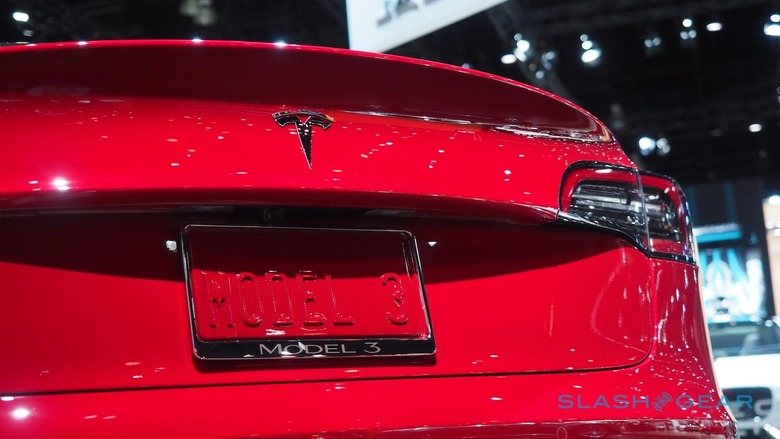Tesla Model 3 Production Overshadowed By Battery Report
Production of Tesla's Model 3 could be further delayed, after reports of ongoing bottlenecks at the company's battery-making Gigafactory. The electric car proved to be a huge success for Tesla, at least in terms of reservations, with hundreds of thousands of would-be drivers placing a $1,000 refundable deposit to secure their delivery spot. However, the company's ambitious production roadmap proved to be tough to stick to.
Issues with mass production and quality control meant that, despite efforts to ramp deliveries of the Model 3 considerably by the end of 2017, Tesla finished the year behind. It delivered 1,550 of the cars in Q4 2017, for example, and pushed back its weekly production goal of 5,000 vehicles to the end of Q2 2018, a three month change. At the time, Tesla said that the decision was based on a "focus on quality and efficiency rather than simply pushing for the highest possible volume in the shortest period of time."
In total, less than 2,000 Model 3 were delivered in 2017. That's despite CEO Elon Musk's previous insistence that it would be making 5,000 of the cars every week by that year's end. Deliveries to buyers other than Tesla employees has begun, however, though the $35k entry-level Model 3 is still not available to order.

Now, CNBC's sources claim, there are potentially more ominous issues at hand. Currently and former employees at the automaker say delays at the Nevada Gigafactory – which is responsible for producing the battery packs all of Tesla's cars use – are more significant than Tesla has let on.
For example, it's said that building battery packs was still being done by hand in mid-December, and that Tesla was forced to borrow staff from manufacturing partner Panasonic to keep up. Each battery pack contains four modules, themselves combining seven so-called "bandoliers" which have li-ion cells glued to each side. Manual assembly of those has been ramped down in favor of machines doing the task, the engineers within the company say, but there are lingering concerns about quality control.
A Tesla spokesperson acknowledged the manual aspect of production, arguing that it was an inevitable part of refining the process. They also strongly denied there was any safety issue with how the batteries were constructed; even if, as the insiders say and the automaker acknowledges, some new employees brought in to work on the line and in quality inspection were relative novices to the industry.
"Until we reach full production, by definition some elements of the production process will be more manual," the spokesperson pointed out. "This is something Elon and [CTO] JB [Strausel] discussed extensively on our Q3 earnings call, and it has no impact on the quality or safety of the batteries we're producing."
"The implication that Tesla would ever deliver a car with a hazardous battery is absolutely inaccurate, contrary to all evidence, and detached from reality," the spokesperson insisted to CNBC.
Rushing battery production at the expense of safety would clearly be a false economy for Tesla, given the potential for legal and regulatory issues down the line. Nonetheless, the sluggish production ramp is likely to add to the skepticism of some, who argue the automaker's production goals remain far-fetched. That's something Musk will need to address if he's to built the company to the $650bn business Tesla has challenged him to – and, indeed, if he's to unlock his maximum pay-out as CEO.
